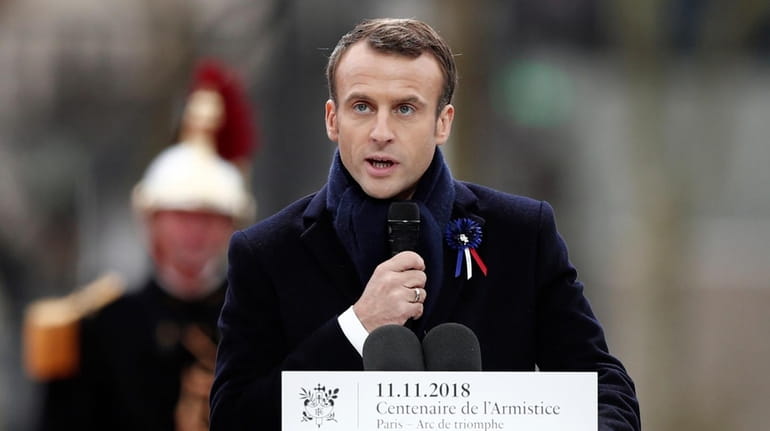A sign of dangerous times ahead?

French President Emmanuel Macron speaks against nationalism on Sunday at the commemoration ceremony of Armistice Day in Paris. Credit: AP / Benoit Tessier
At the commemoration of the 100th anniversary of the end of World War I this weekend, the words spoken about that century-old event had a pointed relevance to the current moment.
At the gathering of world leaders in Paris, French President Emmanuel Macron warned about the return of the “ancient demons” that had unleashed the terrible war and denounced nationalism, which he called “the betrayal of patriotism.” This is widely seen as a barely veiled rebuke to Donald Trump, who recently said he is a nationalist.
But Macron was undoubtedly also referring to trends in Europe, where nationalist/populist movements and parties have been ascendant. Is this a sign of dark and dangerous times, or is nationalism a misunderstood and unfairly maligned idea?
In a commentary on the Real Clear Politics website, former Trump campaign adviser Steve Cortes heaped scorn on Macron for his “smug lecture,” asserting that nationalism is simply “the practical application of patriotism” and a citizens’ revolt against elitist “transnational structures” that trample on the sovereignty of countries. Arguments for what Cortes calls “enlightened nationalism” have been gaining traction in more respectable quarters than the Trump camp. The recent book “The Virtue of Nationalism” by Israeli political theorist Yoram Hazony has received high praise.
Hazony, for whom Israel is a model of positive nationalism, believes national self-interest is the best guarantor of both liberty and stability. He is critical of the liberal internationalism represented by Macron and Barack Obama. Hazony points out that the nation-state historically emerged as a struggle for freedom against multinational empires. Modern internationalism, in his view, is a return of empire, seeking to impose universal concepts of government and human nature across the globe.
Hazony is correct that transnational bodies such as the European Union can alienate ordinary people who feel they have no say in decisions that affect their lives, in contrast to national institutions of democracy; that alienation was behind the Brexit vote in England. The issue of immigration, in particular, has made it clear that Europe needs a better way to balance international cooperation and democratic decision-making: policies imposed by unelected elites have resulted in populist backlash in country after country.
But nationalism, which is not another word for sovereignty or patriotism, still deserves its bad name. While Hazony argues that Nazism was not nationalism but an attempt to rebuild a global empire, it clearly began as an assertion of German interest and German unity. That’s an extreme example, to be sure, but there are plenty of other examples of militant nationalism spurring wars. The causes of World War I were complex; the conflict was largely precipitated by agreements between European countries that triggered interventions on behalf of allies. But it was escalated and prolonged by nationalist pride.
What’s more, while Hazony and other defenders of nationalism assert that it does not conflict with freedom, its guiding principle of national unity can easily become hostile to pluralism. Vladimir Putin’s claim that Russia’s authoritarian regime represents a “sovereign democracy” resistant to foreign meddling is the clearest example of this danger. The populist governments of Hungary and Poland, much loved by Trump supporters, have steadily encroached on judicial independence, press and academic freedoms, and other liberties — and engaged, much like Trump, in xenophobic rhetoric.
If there’s a single lesson World War I offers, it’s that a seemingly stable world can quickly spin out of control and collapse into horror. Today’s nationalist tides are not reassuring.
Cathy Young is a contributing editor to Reason magazine.
